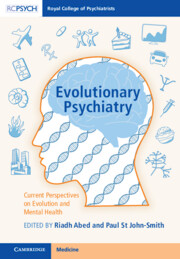Book contents
- Evolutionary Psychiatry
- Reviews
- Evolutionary Psychiatry
- Copyright page
- Contents
- Contributors
- Foreword
- Preface
- Chapter 1 Introduction to Evolutionary Psychiatry
- Chapter 2 The Biopsychosocial Model Advanced by Evolutionary Theory
- Chapter 3 Hominin Evolution I
- Chapter 4 Hominin Evolution II
- Chapter 5 Hunter-Gatherers, Mismatch and Mental Disorder
- Chapter 6 Why Do Mental Disorders Persist?
- Chapter 7 Anxiety Disorders in Evolutionary Perspective
- Chapter 8 Evolutionary Perspectives on Depression
- Chapter 9 On the Randomness of Suicide
- Chapter 10 Evolutionary Perspectives on Schizophrenia Spectrum Disorders
- Chapter 11 Evolutionary Perspectives on Eating Disorders
- Chapter 12 Substance Abuse and Evolution
- Chapter 13 The Social Function of Alcohol from an Evolutionary Perspective
- Chapter 14 Evolutionary Perspectives on Childhood Trauma
- Chapter 15 Evolutionary Perspectives on Neurodevelopmental Disorders
- Chapter 16 Maternal Negativity and Child Maltreatment
- Chapter 17 Alzheimer’s Disease as a Disease of Evolutionary Mismatch, with a Focus on Reproductive Life History
- Chapter 18 Psychopharmacology and Evolution
- Chapter 19 What the Evolutionary and Cognitive Sciences Offer the Sciences of Crime and Justice
- Chapter 20 Evolutionary Thinking and Clinical Care of Psychiatric Patients
- Index
- References
Chapter 16 - Maternal Negativity and Child Maltreatment
How Evolutionary Perspectives Contribute to a Layered and Compassionate Understanding
Published online by Cambridge University Press: 08 September 2022
- Evolutionary Psychiatry
- Reviews
- Evolutionary Psychiatry
- Copyright page
- Contents
- Contributors
- Foreword
- Preface
- Chapter 1 Introduction to Evolutionary Psychiatry
- Chapter 2 The Biopsychosocial Model Advanced by Evolutionary Theory
- Chapter 3 Hominin Evolution I
- Chapter 4 Hominin Evolution II
- Chapter 5 Hunter-Gatherers, Mismatch and Mental Disorder
- Chapter 6 Why Do Mental Disorders Persist?
- Chapter 7 Anxiety Disorders in Evolutionary Perspective
- Chapter 8 Evolutionary Perspectives on Depression
- Chapter 9 On the Randomness of Suicide
- Chapter 10 Evolutionary Perspectives on Schizophrenia Spectrum Disorders
- Chapter 11 Evolutionary Perspectives on Eating Disorders
- Chapter 12 Substance Abuse and Evolution
- Chapter 13 The Social Function of Alcohol from an Evolutionary Perspective
- Chapter 14 Evolutionary Perspectives on Childhood Trauma
- Chapter 15 Evolutionary Perspectives on Neurodevelopmental Disorders
- Chapter 16 Maternal Negativity and Child Maltreatment
- Chapter 17 Alzheimer’s Disease as a Disease of Evolutionary Mismatch, with a Focus on Reproductive Life History
- Chapter 18 Psychopharmacology and Evolution
- Chapter 19 What the Evolutionary and Cognitive Sciences Offer the Sciences of Crime and Justice
- Chapter 20 Evolutionary Thinking and Clinical Care of Psychiatric Patients
- Index
- References
Summary
In Western culture, both the lay public and mental health professionals tend to believe that mothers evolved to love all of their children instinctually and unconditionally. In contrast, any mother who feels ambivalence or hostility towards her child is typically seen as unnatural, and a mother who maltreats her child is seen as behaving pathologically. This chapter draws on evolutionary research to challenge this widespread view of motherhood. In particular, it describes how raising children has required mothers to negotiate a series of complex, precarious and layered trade-offs, and it argues that maternal negativity and child maltreatment can arise from this. The goal of this chapter is to foster a more evolutionarily valid, nuanced and compassionate understanding of motherhood. Such an understanding has the potential to contribute to clinical work with faltering mothers as well as to programmes focused on preventing maternal maltreatment of children.
Keywords
- Type
- Chapter
- Information
- Evolutionary PsychiatryCurrent Perspectives on Evolution and Mental Health, pp. 244 - 259Publisher: Cambridge University PressPrint publication year: 2022
References
- 1
- Cited by

